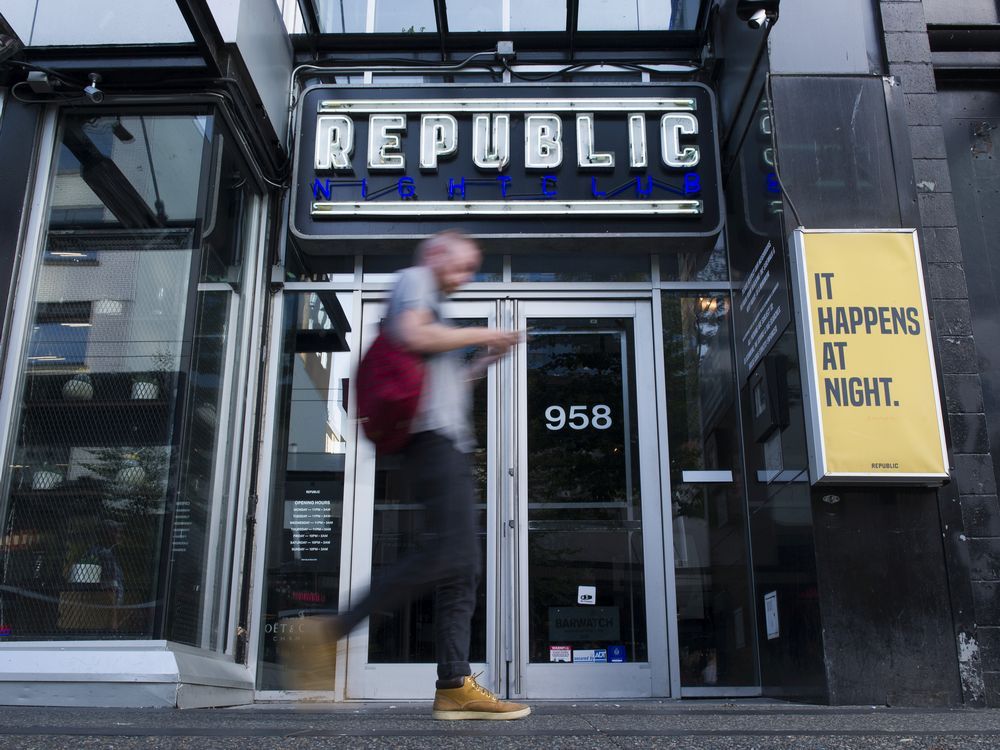The Granville Strip is changing. Where's the next party?

Credit to Author: Zak Vescera| Date: Sun, 18 Aug 2019 15:00:35 +0000
Years ago, Charles Gauthier tried to find a brand for the Granville Entertainment District.
But a consultant told the president of the Downtown Vancouver Business Improvement association that it couldn’t be done. The district, known for its massive nightclubs defied definition.
“He told us it’s an ‘unbrand,’” said Gauthier.
Today, the question of what the area should be is more relevant than ever as clubs are replaced by bars, restaurants and other recreation options, signalling the city’s entertainment district — and its nightlife — is undergoing a fundamental change.
Nearly half the street’s licensed nightclubs have closed in the past decade, and another major one, Republic, is set to close its doors next year to make way for a massive Cineplex Rec Room.
Blueprint, one of the two largest owners of nightclubs in the city, recently converted the Caprice nightclub to a Colony Bar featuring a huge arcade space — a move that director of business development, Nate Sabine, said was a way of diversifying the street’s offerings and moving away from it being a “nightclub district.”
“We’re putting forward choices people want as opposed to people fighting over that same nightclub dollar, or that same 99-cent pizza dollar,” he said.
Gauthier says that model didn’t appeal to millennial audiences, who prefer more “authentic” experiences.
It also fed concerns about the area’s reputation.
Doug McArthur, an SFU public policy professor, supervised a city-commissioned study of Vancouver’s nightlife economy.
It found concerns about safety were deterring women and minorities from visiting the entertainment district, where Vancouver police reported nearly 300 fights and 141 assaults in 2017.
“There’s a perception of the area which is unfortunate because to draw people and a diversity of people, their perceptions are really important,” said McArthur.
Those concerns spurred the creation of a city-working group and calls to restrict bar entry hours to curb on-street violence.
Sabine says changes on the street will make it “healthier” by attracting clients of different ages and tastes.
“In the past we ended up with a really homogenized kind of customer,” he said. “(The working group) really made us get our act together.”
Gauthier hopes this will bring in more restaurants and stores to invigorate the area outside of peak nighttime hours.
“Having a district that only functions on Friday and Saturday night is not an ingredient for success from our perspective,” he said. “You’ve got vacant storefronts during the day — that doesn’t help businesses trying to survive there.”
While Sabine and Gauthier say the shift away from clubs is because of demographics preferences, Yousif Samarrai, one of the masters’ students who produced the SFU report, says it could have something to do with the lack of options in the city that has earned it the nickname “No Fun City.”
Samarrai says the moratorium on liquor licences in the area creates a “downward pressure” making it hard to open new venues. It also means liquor operators lose their seats if a venue is inactive for two years.
That means the “sandbox” of Granville Street, Samarrai says, is underutilized. “People complain about limited options in the city, but operators can’t even provide that,” he said. “It’s just not competitive.”
Samarrai says it’s unclear whether younger crowds — such as those in generation-Z, who are 23 and younger — are uninterested by nightlife or if they prefer “alternative” or do-it-yourself spaces or even festivals, instead of larger traditional clubs.
“If we see less younger people going out, obviously that’s changing tastes,” he said. “But if young people are going out and clubs are closing down, I think that suggests the product is not able to keep up.”
Sabine acknowledges there could be a shift to smaller venues but notes they cater to an entirely different audience than clubs in the Granville area.
“If you’re an underground kid and you’re into really left-field music, you’re probably not going to wind up on the strip, the same way someone who likes top 40 music isn’t going to be in a warehouse space in the middle of nowhere,” he said.
Gauthier expects the strip will change even more in coming years.
Consulting giant Deloitte has temporarily taken over a co-working space in the former Tom Lee building at 919 Granville Street. Microsoft, Amazon and Apple have all expanded or indicated they will expand their presence in this area of Vancouver.
Gauthier says he hopes the city will consider upzoning the area, which could allow for more office and potentially residential space in the nightlife district.
This points, McArthur says, towards Granville becoming more of a “cultural” district than a strictly “entertainment” one — or at least, not the same kind of entertainment.
“The big challenge is how to avoid it becoming a kind of no-go wasteland at night and have it become an attractive area in the heart of our city,” he said.
Sabine has worked in the area for over two decades. In his own words, he’s “seen it all.”
He’s not certain where the district is headed, but senses a more diverse entertainment district can only be a good thing.
“I really feel there’s a golden age coming up,” he said. “I hope I’m right.”